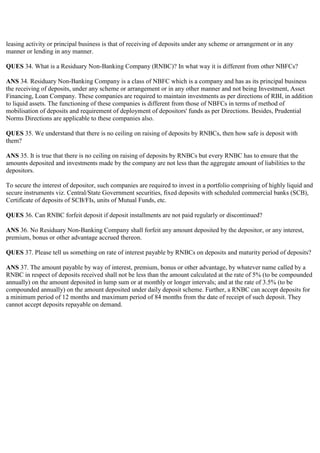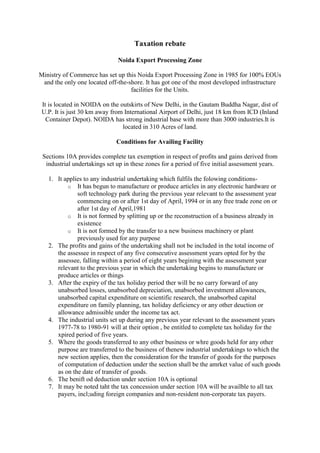The Reserve Bank of India regulates and supervises Non-Banking Financial Companies. The objectives are to ensure healthy growth, ensure they function as part of the financial system within policy frameworks, and maintain high quality supervision. This document provides clarification on regulatory changes and operational matters for NBFCs, the public, and other stakeholders through a question and answer format. Key differences between banks and NBFCs are that NBFCs cannot accept demand deposits or issue cheques, and deposit insurance is not available for NBFC depositors. Registration with RBI is mandatory for NBFCs, and there are requirements around minimum net owned funds, application process, and classifications of different types of NBFCs.
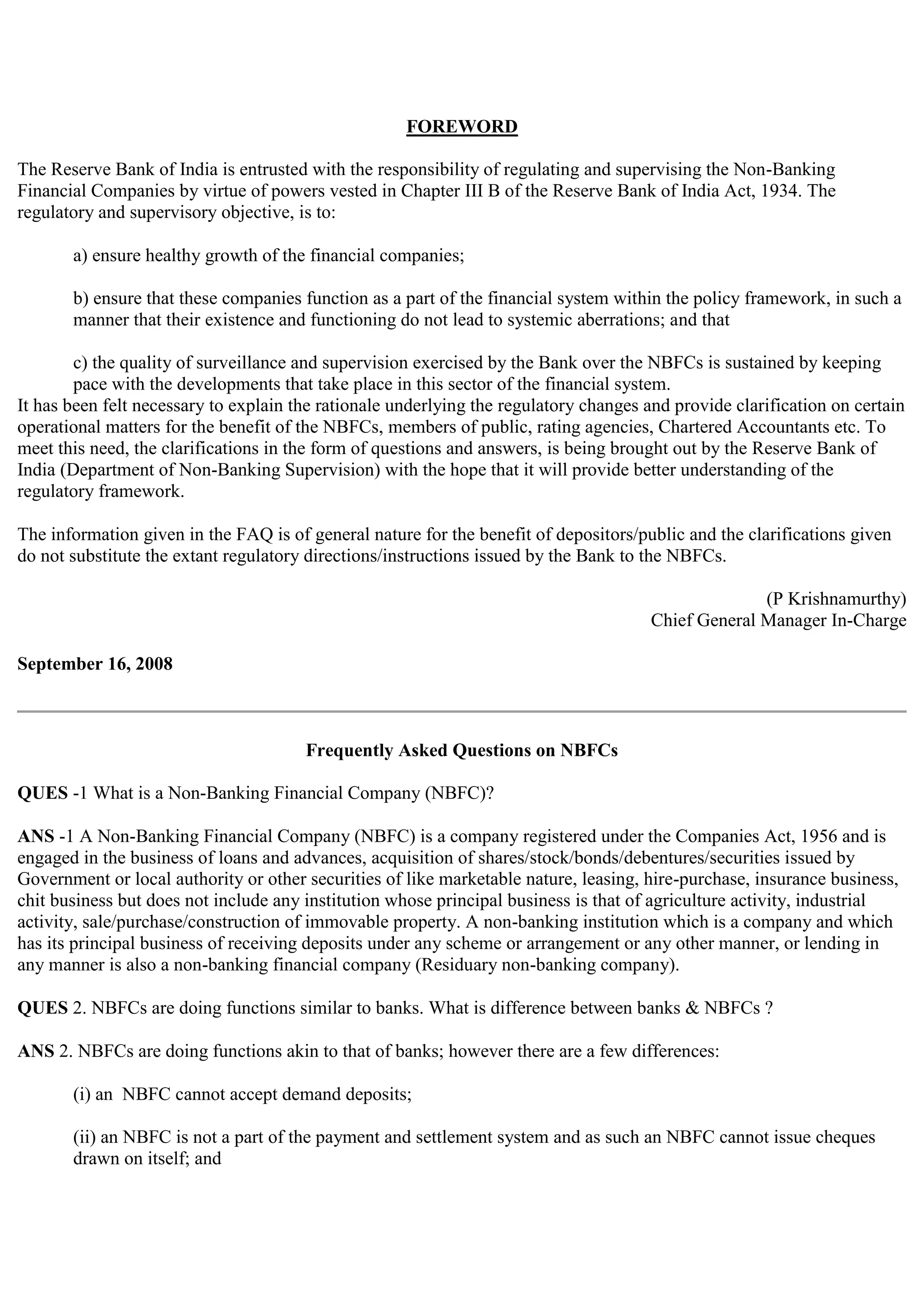
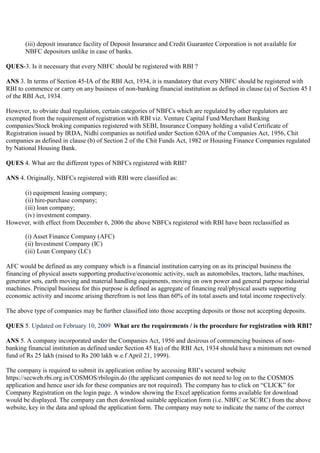
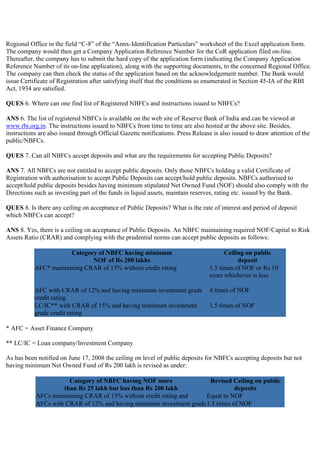
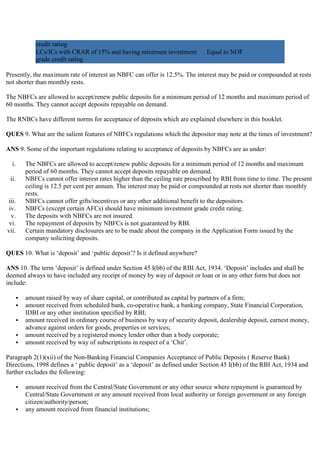
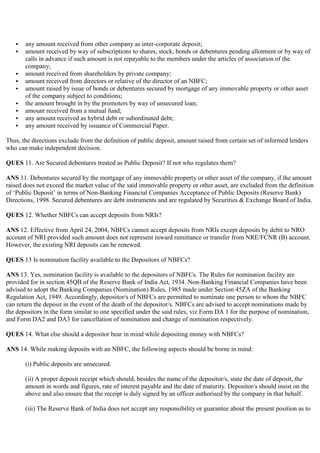
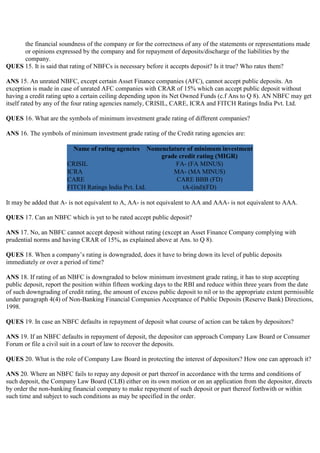
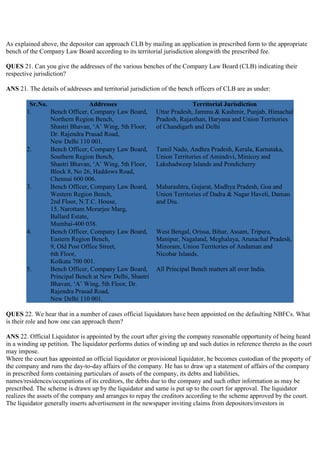
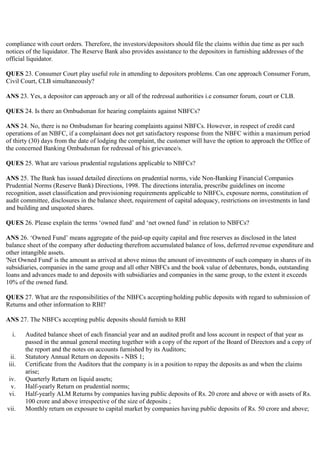
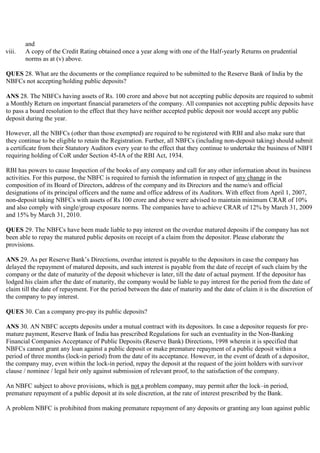
![deposit/deposits, as the case may be. The prohibition shall not, however, apply in the case of death of depositor or
repayment of tiny deposits i.e. up to Rs. 10000/- subject to lock in period of 3 months in the latter case.
QUES 31. What is the liquid asset requirement for the deposit taking companies? Where these assets are kept? Do
depositors have any claims on them?
ANS 31. In terms of Section 45-IB of the RBI Act, 1934, the minimum level of liquid asset to be maintained by
NBFCs is 15 per cent of public deposits outstanding as on the last working day of the second preceding quarter. Of the
15%, NBFCs are required to invest not less than ten percent in approved securities and the remaining 5% can be in
unencumbered term deposits with any scheduled commercial bank. Thus, the liquid assets may consist of Government
securities, Government guaranteed bonds and term deposits with any scheduled commercial bank.
The investment in Government securities should be in dematerialised form which can be maintained in Constituents‟
Subsidiary General Ledger (CSGL) Account with a scheduled commercial bank (SCB) / Stock Holding Corporation of
India Limited (SHICL). In case of Government guaranteed bonds the same may be kept in dematerialised form with
SCB/SHCIL or in a dematerialised account with depositories [National Securities Depository Ltd. (NSDL)/Central
Depository Services (India) Ltd. (CDSL)] through a depository participant registered with Securities & Exchange
Board of India (SEBI). However in case there are Government bonds which are in physical form the same may be kept
in safe custody of SCB/SHCIL.
NBFCs have been directed to maintain the mandated liquid asset securities in a dematerialised form with the entities
stated above at a place where the registered office of the company is situated. However, if an NBFC intends to entrust
the securities at a place other than the place at which its registered office is located, it may do so after obtaining the
permission of RBI in writing. It may be noted that liquid assets in approved securities will have to be maintained in
dematerialised form only.
The liquid assets maintained as above are to be utilised for payment of claims of depositors. However, deposit being
unsecured in nature, depositors do not have direct claim on liquid assets.
QUES 32. Please tell us something about the companies which are NBFCs, but are exempted from registration?
ANS 32. Housing Finance Companies, Merchant Banking Companies, Stock Exchanges, Companies engaged in the
business of stock-broking/sub-broking, Venture Capital Fund Companies, Nidhi Companies, Insurance companies and
Chit Fund Companies are NBFCs but they have been exempted from the requirement of registration under Section 45-
IA of the RBI Act, 1934 subject to certain conditions.
Housing Finance Companies are regulated by National Housing Bank, Merchant Banker/Venture Capital Fund
Company/stock-exchanges/stock brokers/sub-brokers are regulated by Securities and Exchange Board of India, and
Insurance companies are regulated by Insurance Regulatory and Development Authority. Similarly, Chit Fund
Companies are regulated by the respective State Governments and Nidhi Companies are regulated by Ministry of
Corporate Affairs, Government of India.
It may also be mentioned that Mortgage Guarantee Companies have been notified as Non-Banking Financial
Companies under Section 45 I(f)(iii) of the RBI Act, 1934.
QUES 33. There are some entities (not companies) which carry on activities like that of NBFCs. Are they allowed to
take deposits? Who regulates them?
ANS 33. Any person who is an individual or a firm or unincorporated association of individuals cannot accept deposits
except by way of loan from relatives, if his/its business wholly or partly includes loan, investment, hire-purchase or](https://image.slidesharecdn.com/whatisnbfc-120329022721-phpapp02/85/What-is-nbfc-10-320.jpg)
